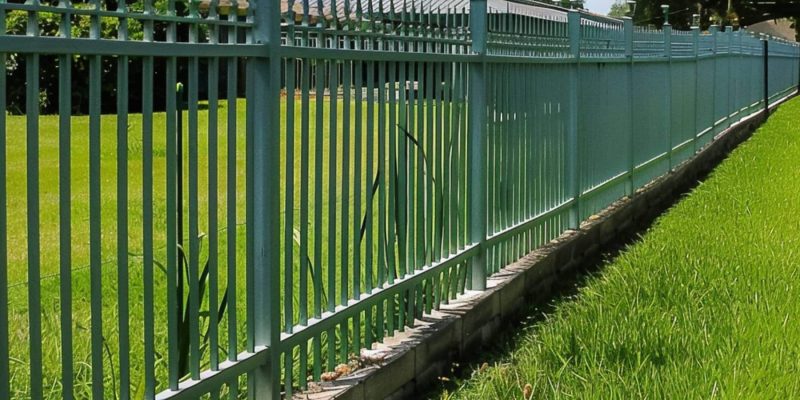Have you ever wondered whether it’s okay to put a fence right on the edge of your property? You’re not alone! Many homeowners have questions about the rules for building fences, especially when it comes to sharing space with neighbors. In this blog, we’ll dive into everything you need to know about placing fences on or near property lines, making sure you’re informed and ready to make the best decisions for your home. Let’s get started!
Understanding Property Lines and Fences: The Basics
Before we talk about fences, let’s understand what property lines are. Imagine an invisible line around your house and yard that shows exactly where your property ends and your neighbor’s begins. Knowing where these lines are is super important if you’re thinking about adding a fence.
In most places, there are laws that say how close your fence can be to the property line. These rules make sure that everyone has their own space and that fences don’t cause problems between neighbors.
The rules make sure that everyone has their own space and that fences don’t cause problems…
Legal Considerations for Fence Placement
When it comes to putting up a fence near your property line, there are a few legal things you need to know:
- State laws and local rules: Florida has its own set of laws about fences, but cities like Gainesville might have additional rules. It’s important to check both so you don’t accidentally break a law.
- Permits: Sometimes, you might need to get permission from the city before you build your fence. This helps the city make sure your fence plan is safe and follows all the rules.
- Specific rules: There can be laws about how tall your fence can be, what it’s made of, and exactly how close to the property line it can sit. These rules help keep neighborhoods looking nice and ensure everyone’s safety.
The Property Line Dilemma: Can You Build a Fence on It?
So, can a fence go right on the property line? The answer depends on a few things:
- Local laws: You’ll need to check Gainesville’s rules. Sometimes, fences can be on the line, but both neighbors must agree.
- Shared fences: If you and your neighbor want the fence to sit on the line, you might need to talk about who takes care of it and how costs are shared.
- HOA rules: If you live in a neighborhood with a homeowners association (HOA), they might have their own rules about fences.
Common Issues and Resolutions
Putting a fence near a property line can sometimes lead to disagreements. Here are a few common problems and how to fix them:
- Disputes with neighbors: The best way to avoid trouble is to talk to your neighbor before you start building. Sharing your plans can prevent misunderstandings.
- Fence encroaches on neighbor’s land: If a fence accidentally goes onto a neighbor’s property, it might need to be moved. It’s a good idea to have a professional check your property lines before building.
- Fence maintenance: If a fence is on the property line, neighbors often share the responsibility for keeping it in good shape. Agreeing on this ahead of time can save headaches later.
The Importance of Communication and Agreements
When it comes to fences and property lines, talking things out with your neighbor can make a huge difference. Here’s why communication is key:
- Sharing plans: Before you start digging holes for your fence posts, have a chat with your neighbor. This can help avoid any surprises and make sure everyone’s on the same page.
- Making agreements: If your fence will be on or near the property line, it’s smart to write down any agreements with your neighbor. This might include who pays for what and how you’ll both take care of the fence. Keeping things clear and in writing can prevent arguments later on.
- Solving problems: If you and your neighbor disagree about the fence, talking it out is usually the best first step. Sometimes, you might need help from a mediator – that’s a person who helps people find solutions without going to court.
Planning and Building Your Fence
Building a fence the right way means following some important steps. Here’s a simple guide to get you started:
- Learn the rules: Before anything else, find out what laws say about fences. Remember to check if you need a permit.
- Find your property lines: This is super important to make sure your fence goes in the right place. You might need a surveyor’s help for this.
- Pick a good fence company: When you’re ready to build, choose a company that knows all about local rules and makes great fences. Asking for recommendations from friends or reading online reviews can help you find the best one.
Frequently Asked Questions
Here are answers to some common questions you might have about fences and property lines:
Can my neighbor make me pay for a fence on the property line?
This question is quite common and the answer can vary based on your local laws and any prior agreements you may have with your neighbor. In most cases and similar jurisdictions, a neighbor cannot unilaterally decide to build a fence on the property line and then demand you pay for half of it without prior agreement.
Voluntary Agreements
If both parties agree that a fence is needed and will benefit both properties, then costs are often shared. This agreement should be documented in writing, specifying details such as the type of fence, total cost, payment breakdown, maintenance responsibilities, and any other relevant details to prevent future disputes.
Legal Requirements
Some localities have specific ordinances that might require neighbors to share the costs of a boundary fence. However, this is not universal, and it’s crucial to understand the specific laws applicable. It’s recommended to consult with a local attorney or the city’s planning department to understand your obligations and rights fully.
Disputes
If disagreements arise about payment or the construction of a fence on the property line, mediation can be a useful tool to find a mutually agreeable solution.
NOTE
In cases where an agreement cannot be reached, legal advice might be necessary to resolve the issue according to local laws and ordinances.
How close to the property line can I build my fence?
The distance a fence must be set back from a property line can depend on several factors, including local zoning laws, the type of fence, and sometimes the fence’s height:
Zoning Laws
Local zoning ordinances will have specific requirements for fence setbacks from property lines. These laws ensure that fences do not encroach on easements, obstruct visibility in right-of-ways, or violate any other local codes.
Permit Requirements
When applying for a fence permit, the exact setback requirements will be outlined. Following these requirements is essential for legal compliance and to avoid disputes.
Neighbor’s Consent
In some instances, if both neighbors agree, a fence may be built closer to or on the property line. However, such agreements should be formalized in writing to prevent future disagreements about the fence location or ownership.
What if my neighbor’s fence is on my property?
A neighbor’s fence encroaching on your property can be a tricky situation to resolve. Here’s what you can do:
- Verification: First, verify the exact property lines through a professional land survey. This will provide clear evidence of any encroachment.
- Communication: Discuss the findings with your neighbor. Often, they may not be aware of the encroachment and are willing to work towards a solution once informed.
- Solutions: Potential solutions include the neighbor moving the fence at their expense, purchasing the encroached land (if desirable), or coming to some other agreement that suits both parties.
- Legal Action: If an agreement cannot be reached, legal advice may be necessary. A court can order the removal of the fence or other remedies, but this route can be costly and time-consuming, making it a last resort.
Navigating Changes and Updates in Laws
Laws about fences and property lines can change. Here’s how to stay up-to-date:
- Keep in touch with the city: Gainesville’s government or your local HOA will have the latest information on any new rules.
- Be flexible: If laws change, you might need to make adjustments to your fence or plans. Being prepared to adapt can make these changes easier to handle.
Conclusion
Building a fence near your property line is a big decision that involves understanding laws, talking with neighbors, and planning carefully. By following these steps and staying informed, you can make sure your fence project goes smoothly and keeps you and your neighbors happy. Remember, when in doubt, communication is key to finding the best solution for everyone involved.

